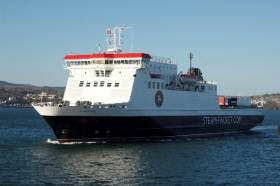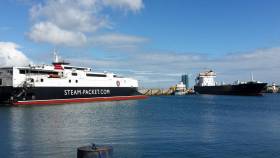Displaying items by tag: Berthing trials
Manx Fastcraft Conducts Berthing Trials in Dublin Port Against Backdrop of Capacity Restrictions & Brexit
#ferries - The Isle of Man Steam Packet's fastcraft Manannan arrived to Dublin Port yesterday to carry out berthing trials against the backdrop of port capacity restrictions and challenges posed by Brexit, writes Jehan Ashmore.
Prior to entering the port by the 850 passenger/200 vehicle Manannan, a routine yet busy succession of ferry and ro-ro freight ships departed through Dublin Bay. They were all bound for the UK to the ports of Holyhead, Liverpool and Heysham.
The Steam-Packet confirmed to Afloat.ie that the Manannan conducted the berthing trials on two berths to determine if either could be used as a back-up in the event access to the normally used berth (at Terminal No.1, the port's busiest) should it be restricted or out of action.
Acquired by the Manx Government last year, the ferry operator is set to resume seasonal service linking Douglas and Dublin on Thursday, 18 April in advance of the Easter Bank Holiday weekend. The 96m Manannan which has operated on the Irish Sea since 2009 is however first scheduled to resume on another seasonal service this week between Douglas and Belfast when sailings start on Sunday, 7 April.
Afloat monitored Manannan carry out the first berthing trial in Dublin where Stena Line operate out of Terminal 2. The terminal is located adjacent to where rivals Irish Ferries use the port's busiest ferry facility at Terminal 1. Also berthed there was another fastcraft, Dublin Swift which during the St. Patrick's Festival began a second summer season for Irish Ferries on the core Irish Sea route to Holyhead in tandem with Ulysses and the chartered-in ropax Epsilon.
In addition at Terminal 1 last month saw the introduction of Irish Ferries much anticipated new giant cruiseferry W.B. Yeats (onto the Dublin-France service) which has doubled in the number sailings by up to 4 weekly on the continental link to Cherbourg. Up to then Epsilon served this route and Oscar Wilde since September, following the apparent closure of Rosslare based routes to France (see below).
W.B. Yeats which at 51,388grt is the largest ferry ever to operate out of Ireland and also brings a Brexit related boost to capacity on the direct link to mainland Europe though seemingly at the expense of Rosslare Europort and the south-east region. As in December, Irish Ferries announced they would unlikely resume services to France in 2019 but added they would keep this situation under review. In the meantime the 1987 built Oscar Wilde remains in dry-dock at Harland & Wolff, Belfast, so what beckons for the future of this cruiseferry?
As widely reported in the media, Dublin Port has imposed restrictions by placing a limit on the number of cruiseships calling to the capital. This is due to Brexit which will force the port to handle increased amounts of freight and cargo directly from mainland Europe, as distinct to depending on services that make up the UK land-bridge to mainland Europe. This will lead to more considered allocation of berths and in particular at Alexandra Basin where a major redevelopment is ongoing as part of the port's Masterplan.
The second of Manannan's Dublin berthing trials took place upriver at Ocean Pier (notably not a ferry passenger terminal). Located here at this same berth linkspan in Alexandra Basin (East) is where the latest Brexit-Buster the newbuild ro-ro freight ship Laureline made a maiden call last week. The giant ship is among the operator, CLnD's fleet including Celine but docks at the adjacent Alexandra Basin from also where direct services run to Zeebrugge in Belgium and Europe's largest port, Rotterdam in The Netherlands.
Laureline which is around the same size in gross tonnage terms of W.B. Yeats, is to return for only the second time to Dublin Port today with an arrival around lunch-hour.
Manx Ferry 'Ben' Has Berthing Trial at Larne Harbour
#ferry- The Isle of Man Steam Packet has conducted berthing trials with Ben-my-Chree at Larne in Northern Ireland.
A similar exercise reports IOM Today was conducted with fast craft Manannan at Larne earlier this year and both vessels carried out berthing trials at Holyhead last year.
The Steam Packet said the trials have been carried out at part of general contingency planning.
Saturday night’s trial involved no disruption to services as the Ben-my-Chree was not scheduled to operate sailings that night.
For more on the story click here
Isle of Man Operator to Take Berthing Trials In Northern Irish Port
#Larne - The Isle of Man Steam Packet is to undertake berthing trials in the Northern Irish port of Larne, writes IOM Today.
The fast craft Manannan is to used as the company assesses the suitability of alternative ports ’to allow for flexible and robust contingency planning’.
Similar to the trials conducted at Holyhead in 2016.
Manannan will return to service on March 31.
After spending the winter in Manx waters, where annual maintenance procedures were undertaken, the vessel is scheduled to sail to Merseyside on March 1 for dry docking and other specialist work before resuming daily services between Douglas and Liverpool.
The Steam Packet has previously operated sailings between Larne and Douglas during the TT festival, using the charter fast craft P&O Express.
A freight-only ferry, Seatruck's ro-ro Arrow on charter to the Steam Packet adds Afloat has been wintering in Larne that has a uniquely rail-connected integrated ferryport terminal. The Arrow has been used to support the operator's ropax ferry Ben-My-Chree during busy periods on island's main route to Heysham.
To read more from the Manx newspaper click here.































































